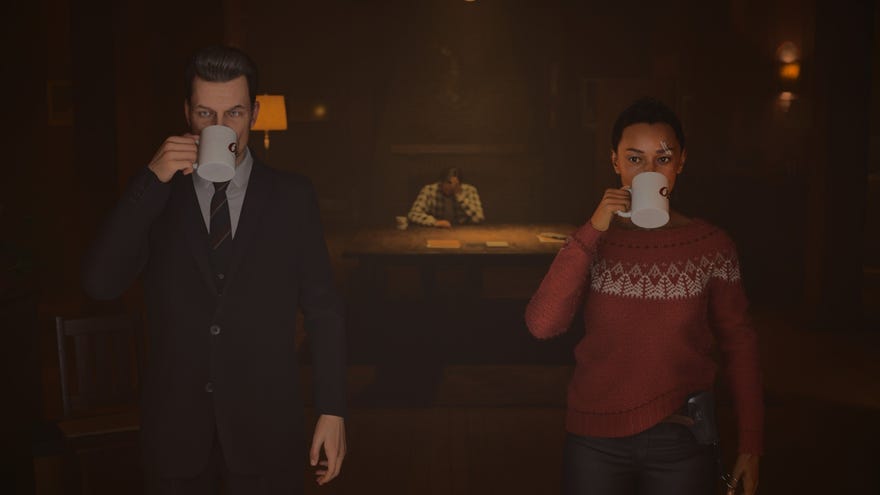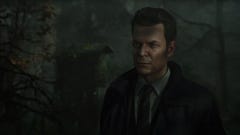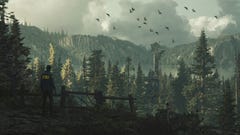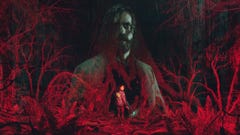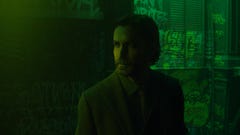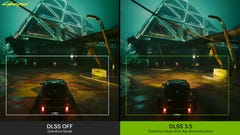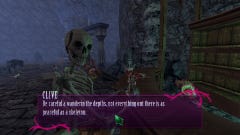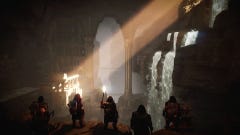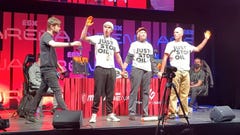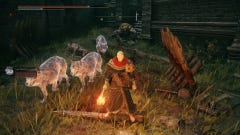Alan Wake 2 is a slow-burn thriller, but so far it's sunk its hooks in deep and good
Our review is still cooking
The Alan Wake 2 review embargo lifts today, but ours needs a bit more time in the oven. Review code only came in late Sunday night, and for a game so heavily reliant on the thrust and resolution of its story, it's imperative I get to the end of it before I deliver my final verdict. Alas, the business of running a website does not play nicely with tight review deadlines like this, but what I can tell you after 15-odd hours of play is that it's really sunk its claws into me good and proper.
Alan Wake 2 is a much creepier, more unnerving kind of horror game than its predecessor, doubling down on its fiction-meets-reality schtick while also piling on the scares and interlacing it with unsettling imagery of teeth-gnashing, inkblot-stained doppelgangers to ratchet up the tension. In many ways, this is a game that owes as much to Resident Evil 7 as it does its own lineage in the genre, and the dual narratives of its two protagonists, FBI agent Saga Anderson and Alan himself, arguably make this Remedy's most sophisticated tale yet.
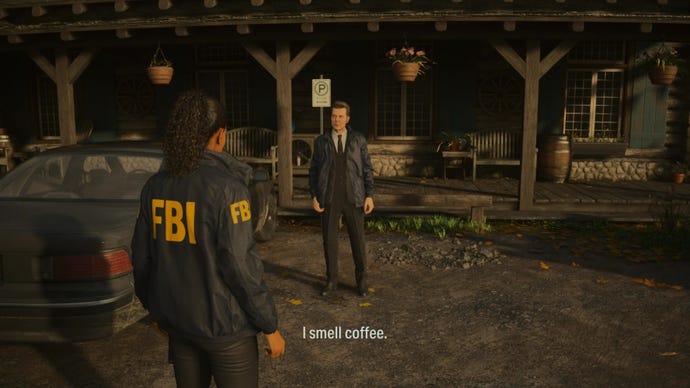
A lot of that's down to newcomer Saga, whose rational and methodical approach to detective work grounds the story in a way that Alan Wake by himself never could - such is his incessant need to narrate his own life story and painfully point out every tiny metaphor, allusion and literary device on the planet. He still does all that in this sequel as he navigates the adorably unsubtle hellscape of The Dark Place, but now that he has Saga to act as a foil for his self-obsessed ramblings, it allows Alan's sections to be seen for the love letter to hardboiled crime novels that they are (or at least try to be, as opposed to just non-stop, clangingly obvious one-liners for 12 hours straight).
Saga, meanwhile, is calm, level-headed and keenly focused on solving the mystery at hand - in this case, a series of ritualistic murders that seem to be plaguing the sleepy Washington state mountain town of Bright Falls, the same town we visited in Alan Wake 1. As you might expect, things start getting weird pretty quickly, but the great thing about Saga is that she's not fazed by any of it. She's not one of those horror protagonists who immediately starts wigging out the second anything strange starts happening, nor does she have to spend inordinate amounts of time fighting against her own mental fragility to keep herself from coming apart at the seams. If anything, the supernatural elements of the crimes positively excite her, and she's able to acknowledge, digest and respond to all the strange shit happening in front of her instead of getting overwhelmed by it. It's refreshing to have this kind of brain at the wheel of Alan Wake 2, and she's certainly one of the better hangs of this year's blockbusters (she certainly has the best knitted jumper of the year, not to mention exceptional hair - truly, top marks to Remedy for the best video game curls of 2023, hot damn).
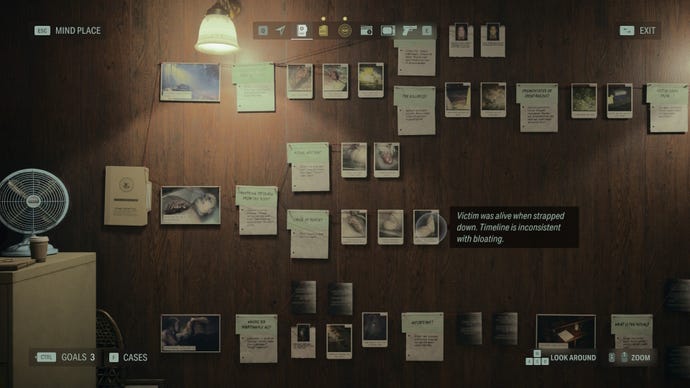
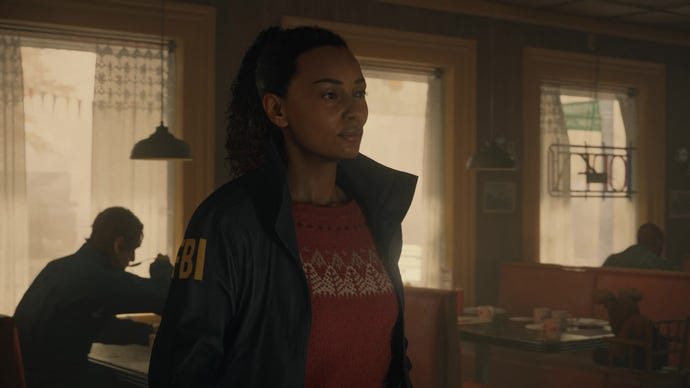
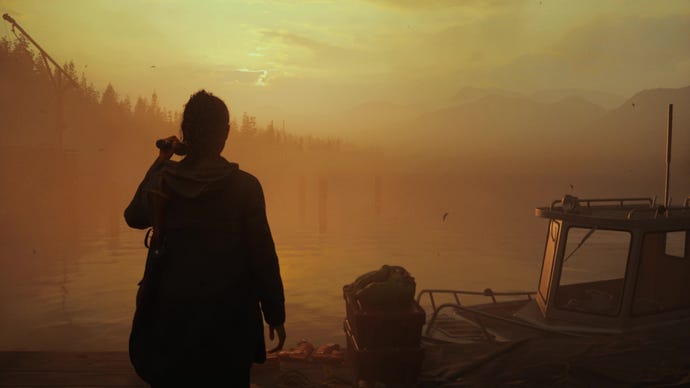
The actual nuts and bolts of her detective work isn't quite as revolutionary as I'd perhaps hoped, mind. Evidence and clues can be gathered by interacting with various objects in Saga's wider surroundings, and to advance the story you must arrange these photos and scraps of text on one of Saga's many evidence boards, which all live inside her own log cabin-style mind palace. Every clue has its own set place on the board, and I like the way each strand shifts up and down when new lines of enquiry enter the picture. What's more, the additional prompts and notes Saga attaches to both completed and open questions in the case make it easy to keep track of what you're meant to be doing next.
At the same time, though, the system is sadly quite prescribed and mechanical in how it all functions and fits together. Attempting to put a piece of evidence in the wrong place simply earns you a 'Tsk' or a 'Nope' or frustrated sigh, and it's a real shame that it automates so much of Saga's deduction process. It's not like I was expecting the next Obra Dinn or anything, but it makes surprisingly few demands on the player when it comes to doing any of the figuring out. In some ways, this is to be expected when Remedy are telling a very set and particular story, but I had hoped they would be a touch more rigorous in how they asked us to piece everything together. This is particularly true when it comes to Saga's Profiling ability, which helps her uncover some slightly more… creative solutions to the problems at hand. In practice, they're little more than miniature cutscenes that spit out answers at the end of them, but some leaps of logic have verged on being so outlandish that even I was left wondering how she came to that conclusion. If I'd been involved in joining some of those dots myself, on the other hand, maybe they might not have seemed so implausible.
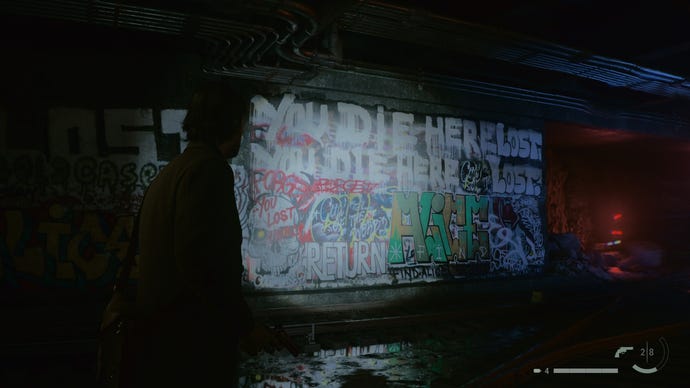
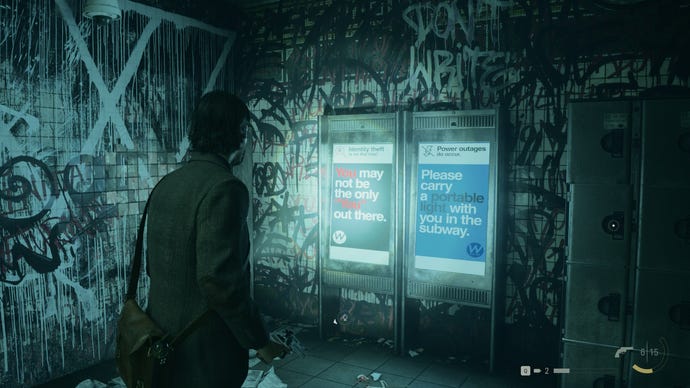
Still, even if Alan Wake 2 doesn't end up taxing your brain too much, you'll certainly feel the squeeze on your old nerves. Remedy weren't kidding when they said this is much more of a survival horror game than Alan Wake 1, and the way it blends its two realities together by transposing scenes on top of one another, and punctuating its transitions with sudden, fleeting shots of screeching, startling images genuinely made me jump a couple of times while I was playing. Combined with its menacing soundscape that immediately unsettles the moment it kicks in, Alan Wake 2 has gone all in on making you feel discombobulated, and it's damn effective - especially when it starts messing about with Alan's returning flashlight tactics, and the way he can use his 'ideas' board in his own version of Saga's mind palace to rewrite and change the scenery in front of him in real-time.
Crucially, though, its hard lean into psychological horror hasn't yet tipped over into feeling overwhelming or like I just want it to hurry up and end already because it's too stressful. I may have already played the equivalent of an entire Resident Evil campaign so far, but right now, Alan Wake 2 only just about feels like it's getting going - and I've really been enjoying how deliberately slow-paced it is. Even now, it's keeping its cards very close to its chest, and I still don't feel like I know where the story's going yet. But I'm excited to find out and keep playing, because if Remedy can stick the landing on this, then Alan Wake 2 could really be something special. So hang on for a few days more, and I'll hopefully have my final review ready for you early next week.
